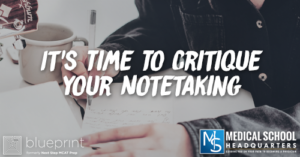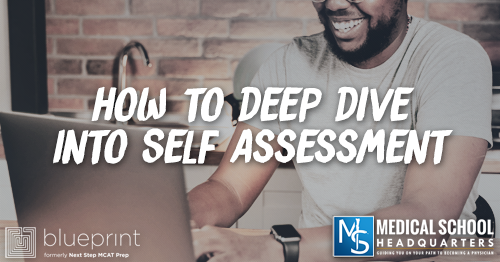Apple Podcasts | Google Podcasts
Session 321
Is the way that you’re taking notes hurting you or helping you with your MCAT prep? Find out now!
We’re joined by George from Blueprint MCAT. If you would like to follow along on YouTube, go to premed.tv.
Listen to this podcast episode with the player above, or keep reading for the highlights and takeaway points.
[01:53] The Benefits of Taking Notes: Strategies for Efficient Note-Taking
According to several research studies, actively taking notes can significantly improve the retention of information. However, it is important to consider the nature and usage of the notes.
Handwritten or Typed Notes?
While many studies emphasize the benefits of handwritten notes, the actual advantage lies in active engagement during note-taking. Whether handwritten or typed, the key is to actively process and condense the information being presented.
In today’s digital age, note-taking often involves typing, which can lead to a passive learning experience. Merely transcribing what is being said without actively engaging with the content hinders true understanding and retention.
Efficient Note-Taking Strategies
To optimize note-taking, it is crucial to consider the purpose of the notes. Creating a resource that can be revisited periodically is valuable, but simply transcribing without critical thinking may not serve this purpose effectively.
Instead of focusing on transcription, explore strategies that help you create better resources for yourself. Find methods that encourage active engagement, such as summarizing, integrating, and personalizing the information. Efficient note-taking allows you to maximize your learning time. By finding ways to streamline the note-taking process, you can avoid spending excessive time on transcription and formatting and focus on grasping the core concepts.
Remember, the goal of note-taking should be to create a useful resource that promotes understanding, retention, and ease of review. Find a note-taking method that works best for you and supports your learning objectives.
[05:53] Strategies for Active Learning through Effective Note-Taking
Reinterpret information in your own words.
To make note-taking an active learning experience, it is essential to reinterpret information in your own words and relate it to personal examples. This process adds meaning and aids in better retention of the material.
Use other modalities like speaking out loud, visualizing, or using gestures.
Passive learning, such as transcribing without critical thinking, can hinder comprehension and recall. Instead, actively use multiple modalities like speaking out loud, visualizing, and even using gestures to reinforce learning.
Use prompts and keywords.
Rather than writing detailed notes, focus on capturing key prompts and keywords that can trigger your memory later. These prompts serve as cues to help you recall and explain concepts when revisiting your notes.
It’s important to find a note-taking method that works efficiently for you. Instead of wasting time on unnecessary details or rewriting entire lectures, learn to use annotated slides and color-coding techniques to highlight key takeaways.
Active Learning Beyond Note-Taking
Note-taking is just one aspect of active learning. To truly internalize the material, practice incorporating your learning through activities like solving practice questions, applying concepts to real-life scenarios, and engaging in discussions.
Merely reading and rereading notes is not enough for long-term retention. Actively pull information from memory by quizzing yourself multiple times. By doing so, you reinforce neural connections and enhance your ability to recall information on test day.
[10:25] The Power of Teaching and Active Recall in Learning
Teaching others requires a deep understanding of concepts, as it involves rewording information in one’s own words and providing concrete examples. This process forces the brain to evaluate comprehension and identify any gaps in understanding.
“Teaching is actually a very high level of learning because you need to understand a concept enough that you can reword it into your own words, language, and examples.”Click To TweetTo ensure information truly sticks, it is important to go beyond passive learning methods like watching videos. Actively integrating knowledge through strategies like speaking out loud, practicing with questions, and engaging in quizzes or flashcards enhances encoding and retention.
[11:47] Optimal Learning Strategies for Success in the Medical Class
Taking a pause to interpret information and thinking about potential questions that could arise can be a valuable strategy. By adopting the mindset of a test writer, you can deepen your understanding and identify areas that require further exploration.
Designing Quizzes and Leveraging External Resources
George shares that in their medical class, they have an exceptional student who goes above and beyond to enhance their learning experience. At the end of each block, she takes the initiative to design her own quiz questions. To further enrich her quizzes, she taps into external resources like ChatGPT. This approach not only solidifies her understanding of the content but also encourages critical thinking by exploring different perspectives.
The Significance of AAMC Tests
While designing personal quizzes is valuable, it is important to save the AAMC tests for later in the preparation process. These tests serve as the gold standard for evaluating logical reasoning skills, mirroring how the AAMC will assess our knowledge. While memorizing concepts is essential, supplementing them with practice tests is equally crucial.
Integrating Test-Like Practice into the Learning Process
To optimize your learning, George recommends taking a pause after watching a module, verbalizing the key points, and immediately engaging in test-like practice sessions. Within Blueprint MCAT, we have access to the QBank, where we can select specific topics or sections and create personalized questions.
For instance, after studying a module on learning and memory, we can generate five to ten discrete questions on this topic. This practice not only deepens our understanding but also familiarizes us with the way the MCAT will test our knowledge.
“The best approach you can take is to see the content, integrate it, say it out loud, write prompts for yourself, and then from there, dive into practice test.”Click To TweetDeveloping Application Skills through Priming
Encountering challenging questions where you struggle to apply your knowledge is common. You may be familiar with the underlying concept or equation. But then you could face difficulties in recognizing when and how to use them effectively. This is where the skill of priming becomes vital.
By understanding how the MCAT tests specific concepts, you can improve your ability to identify and apply relevant knowledge when faced with similar questions.
Balancing Content Knowledge and Application
Maintaining a balance while studying for the MCAT is crucial. It is essential to grasp key details and mechanisms. However, it is equally important to recognize broader categories and transitions between functional groups. Striking the right balance allows us to focus on the content that will be tested, improving our overall performance.
[15:01] What Test-Like Practice Means
“The MCAT has a certain logic. It's very much an application exam.”Click To TweetWhen studying for the MCAT, it’s crucial to go beyond surface-level knowledge. For example, while alanine is often classified as a nonpolar amino acid due to its unique side chain, it is important to recognize that as a molecule, it is actually polar. Alanine contains an amino group, a carboxylic acid group, and an R group, making it a complex structure. This understanding is essential for correctly answering questions that assess the properties of alanine as a molecule, rather than solely focusing on its side chain.
The Application-Oriented Nature of the MCAT
The MCAT goes beyond simple memorization and regurgitation of facts. It tests a student’s ability to apply their knowledge in real-world scenarios. Rather than asking for definitions or examples in isolation, the MCAT presents questions based on experiments, passages, or scenarios. Those require applying fundamental concepts to interpret and analyze the given information. Therefore, it is important to prepare for the MCAT by engaging in test-like practice that emphasizes the application of knowledge in context.
Emphasizing Application in Test Preparation
To excel on the MCAT, it is vital to focus on test-like practice that mirrors the real exam experience. This includes practicing with passages, experimental designs, and data interpretation. By exposing oneself to these types of questions, students can become familiar with the way the MCAT tests their understanding and develop the necessary skills to apply their knowledge effectively.
While content memorization is important, it is equally crucial to hone the ability to apply that knowledge in practical situations encountered on the MCAT.
Balancing Content and Application
Striking a balance between content knowledge and application is key to success on the MCAT. While it is crucial to have a strong foundation of core concepts, it is equally important to develop the ability to think critically and apply that knowledge to complex scenarios.
By integrating test-like practice and consistently challenging oneself with application-oriented questions, students can enhance their problem-solving skills and maximize their performance on the MCAT.
'Test-like practice is getting yourself in a situation when you start to see what is the MCAT going to ask me about and how are they going to ask me about it – not just regurgitating content.'Click To TweetPreparing for the MCAT goes beyond rote memorization. It requires a comprehensive understanding of key concepts and the ability to apply that knowledge in practical situations. By focusing on test-like practice and emphasizing application-oriented learning, students can effectively prepare themselves for the challenges they will face on test day.
[17:16] Final Thoughts
When it comes to studying for the MCAT, it’s important to consider the most effective strategies. Rather than simply taking copious notes, a more efficient approach is to focus on understanding the material and assessing your comprehension. Instead of extensive note-taking, try summarizing key concepts with a few bullet points or key terms.
Later, challenge yourself to explain the topic to others, even if it’s just talking through it with your pet or stuffed animals. This exercise will help solidify your understanding and identify areas that may require further review.
“We're not saying don't take notes, we're saying take notes in a more strategic way – actively and efficiently.”Click To TweetFinally, efficiency plays a crucial role in MCAT preparation. As you embark on your study journey, prioritize maximizing your productivity and sanity. Remember, time optimization is key. Instead of exhaustive note-taking, focus on comprehension and retention through active learning approaches. By leveraging efficient strategies, you can make the most of your study time and achieve optimal results.
Links:
SEARCH SITE
SEARCH SITE
LISTEN FOR FREE












